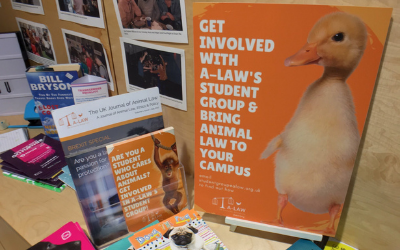By Addison Luck, Earth Law Manager for the Earth Law Center
In 2016, eight American organizations, including the Animal Legal Defense Fund (ALDF) and People for the Ethical Treatment of Animals (PETA), challenged North Carolina’s controversial ‘ag-gag law’ as a major violation of free speech in the United States. The case was first dismissed by a district court and then reversed by an appellate court. But then in June 2020, after gaining support from several news organizations, the advocacy groups won the case in federal court. The presiding judge, Thomas D. Schroeder, found much of North Carolina’s ag-gag law to be unconstitutional, exceeding the limits of free speech protected by the First Amendment.
In an effort to shield factory farms and industrial agriculture from the public eye, seven American states (in consecutive order: Kansas, Iowa, Utah, Missouri, Idaho, Wyoming, and North Carolina) have passed a variety of ag-gag laws over the past 30 years, although five of these laws have subsequently been declared unconstitutional. Originally, states justified these laws as protection of the industrial animal agriculture industry from the negative economic effects associated with public awareness. Historically, increased media coverage of factory farm practices and animal welfare has resulted in lowering meat demand. In order to avoid this loss of business, factory farms have extensively lobbied for laws that criminalize exposing their actions. As Alicia Prygoski from Michigan State University College of Law states, there are three categories of ag-gag laws, all of which punish whistleblowers seeking to expose horrific industry practices. These categories are: (1) agricultural interference laws, which ban recording images and sounds without consent; (2) agricultural fraud laws, which ban applying for employment with false pretense; and (3) rapid recording laws, which require anyone who records images or sounds to turn these recordings in to authorities within 48 hours.
Passed in 2015 as the Property Protection Act, North Carolina’s ag-gag law, a hybrid of the three types, was a response to leaked footage of factory farm workers mistreating turkeys and chickens. Trying to create a permissible law that would be sufficiently different from the failed ag-gag laws of other states, North Carolina passed the Property Protection Act to allow employers to sue employees for recordings, interferences, or employment fraud, rather than criminalize the actions themselves. One supporter of the law, Republican Congressman Chuck McGrady, defended it by claiming of factory farms — and practices that take place within — “I don’t think an employee, or somebody doing deceptive things, ought to be able to go and collect evidence of whatever wrongdoing that’s out there,” he said during the House debate. “It’s personal property, folks. It’s something that’s protected in our Constitution.”
Judge Schroeder, however, disagreed. In his 2020 ruling, Schroeder stated many parts of the 2015 law clearly violated the First Amendment and were unconstitutional, while certain aspects of the law were sound, such as employers suing employees for knowingly opening a gate in order to free livestock.
As David Muraskin, one of the attorneys representing the advocacy organizations, noted, the ruling comes at a pivotal time. The COVID-19 pandemic has highlighted sanitary and ethical issues surrounding working conditions in American factory farms. The ruling against this ag-gag law offers greater potential protection and freedom for factory farm employees, and it allows for greater insight and public accountability into factory farms. Although their original existence in seven American states is alarming, ag-gag laws (along with their desire to silence whistleblowers and protect factory farms’ inhumane practices) continue on the downward trend thanks to Judge Schroeder’s recent ruling. North Carolina has become the fifth state to pass an ag-gag law that has subsequently been determined unconstitutional, and 17 states have rejected ag-gag legislation proposed by industrial agriculture interests.
Recently, however, governments outside the United States, including the Canadian provinces of Alberta and Ontario, have adopted American-style ag-gag legislation, and it becomes pressing that this attempt to suppress public awareness, investigative journalism, and free speech does not propagate around the world.
Sources:
Animal Legal Defense Fund (2020), “Challenging North Carolina’s Ag-Gag Law.” https://aldf.org/case/challenging-north-carolinas-ag-gag-law/
Animal Outlook, “Mountaire Facility Animal Abuse Investigation.” https://animaloutlook.org/investigations/mountaire/
Douglas, Leah (2020). “Mapping Covid-19 outbreaks in the food system.” Food and Environment Reporting Network. https://thefern.org/2020/04/mapping-covid-19-in-meat-and-food-processing-plants/
Mercyforanimals (2011), “Butterball Abuse: Undercover Mercy For Animals Investigation Reveals Cruelty.” YouTube, https://www.youtube.com/watch?v=D5LM06ZvCk4&feature=youtu.be&has_verified=1
People for the Ethical Treatment of Animals et al. v Stein (2020), Case 1:16-cv-00025-TDS-JEP. https://www.publicjustice.net/wp-content/uploads/2020/06/NC-Anti-Sunshine-2020.06.12-Dkt.-No.-138-Decision.pdf
Prygoski, Alicia (2015).“Brief Summary of Ag-gag Laws.” Michigan State University Animal Legal and Historical Center. https://www.animallaw.info/intro/ag-gag-laws
Tonsor, Glynn T. and Olynk, Nicole J. (2010), “U.S. Meat Demand: The Influence of Animal Welfare Media Coverage.” Kansas State University, https://www.agmanager.info/livestock-meat/us-meat-demand-influence-animal-welfare-media-coverage
Yeoman, Barry (2020). “Judge Declares Much of N.C. Law Unconsitutional.” Successful Farming, https://www.agriculture.com/news/business/judge-declares-much-of-nc-ag-gag-law-unconstitutional
The term “ag-gag” denotes legislation that prohibits covert documentation or investigation of conditions in the farming industry. The term is chiefly used by opponents of such legislation. (Oxford Dictionary)
“Factory farm” refers to a system of rearing livestock using highly intensive methods, by which poultry, pigs, or cattle are confined indoors under strictly controlled conditions. (Oxford Dictionary)







